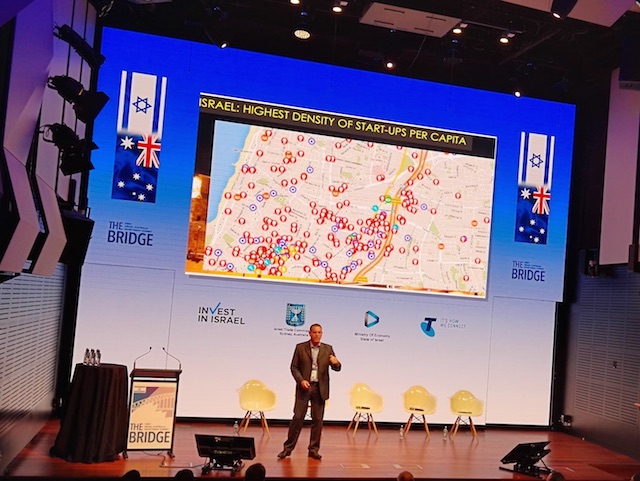Jon Medved is one of those credited with driving the current Israeli startup boom having been involved as either a founder or investor in over 100 startup companies over the past two decades.
His current venture, OurCrowd, is a fund raising platform for startups seeking investors. Since being launched in 2013 the service has raised over $34M for 31 portfolio companies.
At the Australian-Israeli Bridge Investment summit in Sydney last week, Jon was a keynote speaker and panellist describing the startup and technology landscape of Israel. Following his morning sessions, he spoke to Decoding the New Economy about Crowdfunding, investment regulation along with both Australia and Israel’s place in the world.
Thanks Jon, let’s start with what OurCrowd do
We’re the world’s largest equity crowdfunding platform. We focus on sophisticated investors. What they call in America an accredited investor, which means that you have to have substantial assets in order to crowdfund at this point because we’re offering shares in private partnerships that then are essentially investing on a per company basis so it’s more like democratized venture capital than it is classic Kickstarter crowdfunding.
You, as an individual, to get into one of my deals have to commit $10,000 per deal. So that’s real money. You get complete choice. We sift through thousands of companies, select about 2% of those that we look at. We put them up on our website. We invest our own money and then you just choose to join us. We aggregate the variety of the investors and join us from 110 countries around the world and then we write a single check with the aggregated amount and that’s often millions of dollars so it’s not like couple 100k or 50k. This is real money.
Our biggest round has been $16 million with the other money. We invest in companies across all sectors and all stages. We’re sector agnostic as well as stage agnostic and we’re now geography agnostic. We’re from Israel and the majority of our deals are in Israel, but we’re increasingly investing in the States. Here in Australia, we’ve done two deals. Our first was launched, our first deal in India, deals in the UK, soon Latin America, etc., etc.
So where are the areas that you’re seeing the biggest growth?
The Internet of Things is just unstoppable.
On the hardware side or on the software analytics side?
Both, we have software for inter-device connectivity. We have software for big industrial control of the Internet of Things. We have devices themselves that are really cool. Things that are doing location of things, things that are doing analysis of non-connected devices. We have companies that are linking the physical world to the virtual world. I’m just a huge believer. I think this is such a big trend, and we haven’t even seen the beginning of it. It’s just getting started.
How did the idea of OurCrowd come about?
I’ve been 30 years on the tech business as an investor and as an entrepreneur, taking companies public, have been bought. I ran venture capital funds. I’ve been an Angel Investor, so I’ve been around the block several times.
I’m too young, at least in spirit, to hang up the spurs, and I wanted to do something that would combine three distinct loves that I have. One is I love investing. Two, I love disrupting and being an entrepreneur. And the third is I love Israel. I live in Israel. But I really believe that Israel has a role to play in history and the world beyond its small population.
I tried to mix up investment, entrepreneurship, and Israel, came up with OurCrowd because the idea is that today, the whole venture capital angel investing thing is very important in terms of powering innovation, but no one has disrupted that or changed that methodology for 50 years.
Some old venture funds, some old angel investments and some of the disadvantages of current practice is number one, you’re limited typically regionally or city. There’s the Boston Common Angels or South Coast Angels or the Melbourne Angels that, God forbid, don’t invest in Sydney. That’s fine for that period of time. That doesn’t work anymore. Basically, you’ve got to be global. The companies need global help. I’m here. Are they okay?
So, this was very disruptive I think of the existing way the people invest because it was going to turn something which had been very hyper and local into a global event, but it was also going to disrupt the business by bringing in completely uninvolved people. It turns out that in America, which I know very well, there are 10 million of these accredited households. About a hundred thousand have ever made an angel investment.
Literally, 1% of the rich people have ever done this kind of investing. So, I said, “Before we bring the whole world then which is going to happen, and people are working on legislation here and elsewhere, let’s first empower the wealthy to get access to these deals because really, if you look at who are the guys who’ve been investing in the next Facebook or the WhatsApps of the world, same couple of hundred angel investors in Silicon Valley and maybe the same 50 funds and everybody else has been screwed.
Basically, you’re not invited to the party. You know when you can get to the party? It’s when these companies get public. That’s what they’re called private companies. They only problem is that these companies go public and they are already at $50 billion valuation. Who wants to come to that party? It’s not a fun party. I want to get people into the company when they’re being priced at $10 million or $5 million or $20 million so you can ride it to the billion dollars and the individual can make a hundred times his money or hundreds of times the money.
I think we are disruptive both on the global thing in terms of being inclusive and giving people choice because until now, the Faustian bargain you had to make was either I’m going to have a choice, therefore, I am an angel which means I’m on my own. If I’m the newbie, figure it out, read a book, get a mentor. How do I make an investment like this? What’s a term sheet? What’s preferred stock? Who’s the lawyer I should use? How do I…That’s very hard for somebody who doesn’t grow organically in the system to access that.
You could go to a venture fund, but at a venture fund get ready to write a million or $5 million check. Get ready to be turned down by all the good funds in the valley who don’t need your money, and get ready to not have any discretion or fund. You can’t choose a deal. You basically hand over the money and say, “See you in 10 years.” It becomes like another investment. I said, “No, let’s go find a way to let people choose their own investment but within a safe platform in context where we’ve done the work, where we handle the legal, we protect the rights, we aggregate everybody so when we invest, we’re treated like the big boys. We get the same stock that a General Electric or an Andreessen Horowitz or a Telstra will get, we get for that individual. And you can get in for 10 grand. That’s where the subversive part comes.
I came up with this idea, figured that it would also be a really cool way to help Israel because all these people that get hot and bothered about startup nations, “Okay, yeah. I want to invest.” Good luck. How do you do it? They still have that same problem. They’ve got to go do it on their own and figure out, especially if they’re living abroad, how do you do that? Or find a venture fund. This is a different way, and it’s got legs. And we’ve managed now to cross the $200 million threshold. We’re $50 million Aussie dollars raised here, which is pretty cool. So it’s a big chunk of the money coming from Australia. Got a thousand investors here, 10,000 around the world, 90 companies and growing fast.
Were there any specific reason, apart from your own passion about Israel, for setting up there?
No, because our regulatory approach, which I think is the right one has been based on…In the U.S., they call it Reg D 506, but it’s all based on the exemption you get for being a venture capitalist or the exemption you get to do private placements among accredited or sophisticated investors. The regulators worldwide basically say, “You know what? If you got bucks, we leave you alone as long as you play by the rules, but we’ll not regulate these private in place because otherwise, how the hell will your companies grow to get ready to go public?”
We threaded that needle if you will, and restrict our platform to those who are accredited or sophisticated according to their…Is it they call it qualified. Each area is different. In Israel, at the moment, it’s like almost $4 million of assets. The test here in Australia is two and a half. In the U.S., it’s only 1 million outside of your home. There are different income tests, and we essentially geolocate our websites. We flow those requirements down based on where you’re from. We spend a boatload of money on our friends, the lawyers. We have a lot of lawyer friends.
We talk to the regulators regularly because they’re really trying to figure this out and want to open this business up except they have a series of difficult decisions to make. So their first big decision is whether or not they want to do this according to a junior IPO model which says, “Okay, go ahead and let the crowd into invest in startups but, they’ll buy stock directly in the company.” They’ll call them issuers. For example, the proposed regs here in Australia demand that the companies become non-listed public companies.
They demand 20 or more shareholders already, then we’ll let you crowdfund. Our whole approach is no, these guys should all go directly on the cap table. With all due respect, that screws it up. It prevents venture capitalists of note to really come. In other words, if they’re serious VCs, a company with a hundred or 200 individual investors, some with couple hundred dollars, forget it.
They’re going to go, “This is too hard.”
Because all these guys got to sign documents. It’s a mess. They got to vote. Our structure, which is to have a SPV (Special Purpose Vehicle) or intermediary partnership whereby we act as the nominee, we’re managing the process, we have a board member, that first of all, affords protection to the investor so they now have the right to get over a certain percentage of holding, which gives them anti-delusion, anti…They get preemptive rights. They get information rights to all the good…which the VCs have.
Now, we flow that down to our individual investor which no standard crowdfunding platform would have. More importantly, it’s good for the company because they now got a single shareholder who looks just like another VC fund and so we get to bring the company the advantage of having thousands of investors interested on the platform and pushing them forward but none of the headache of having to manage them all directly.
The regulators hopefully will figure out that our kind of structure doesn’t have to be mandated but should be at least allowed and in certain parts of the world, the regime as they are foreseeing it transform from accredited only to non-accredited broad based from what they call wholesale to resale, wholesale to retail, they are not allowing this, at least for the retail. If that’s the case, we won’t be in the retail again. We’ll stay with the accredited supposed to get it because we believe this is a sine qua non.
We don’t want to get a placement fee that the company pays or a slotting fee to go raise money. That’s going to get a negative selection process. It’s basically going to say that, “You know what, crowdfunding, you get the remainders,” the type B, like the socks or the underwear that have a defect. The better companies will go to venture capital. The worse ones, you’ll have to deal with that. Maybe you’ll get lucky.
That’s totally not our approach. Our approach is, we want to invest alongside Sequoia, Andreessen, Excel, and we do. In other words, we get OurCrowd into those deals which you really want to get into and in order to do that, it has to be managed. It has to be aggregated into a venture partnership, and then we want the focus of the whole process to be not ending at funding, but beginning at funding because the biggest mistake that the junior IPO approach makes is when you do an IPO, you hand the check over to the company. It’s gone public. You say, “Good luck.” Maybe you cover it.
In research, if you’re an investment bank, maybe you’ll try to do a secondary later, but you’re not involved. You don’t sit on the board, you don’t give guidance, you’re not trying to add value all the time. Whereas in venture, if you don’t, that’s the definition of dumb money. You don’t want to be dumb money. You want to be involved and we want to use our special asset, which is the fact we got these 10,000 global investors that can provide access and assistance to these companies like nobody’s business.
Going back to that regulation side, which jurisdictions do you think are ahead of the pack in this?
Look, UK is really ahead because they have just basically almost chosen not to regulate. I think that’s interesting. I think that this whole business can be fraught with danger, and I think there is regulation in the UK but very, very light handed. I think that’s the right approach.
I think that we’re going to have to experiment, we’re going to break some eggs and let the market figure out which model works. Hopefully, people will not get ripped off. By the way, just recently there was a terrible fraud in the U.S. from a guy who put together an oil and gas deal that seems to have gone on the lam and that was one of these platforms where they don’t do diligence.
Part of our whole gestalt is that we not only curate the investors and manage the deals and build SPVs, but we carefully diligence every company. We make mistakes like anybody else, but at least we hope we’d be able to weed out the obvious frauds unlike other sites that just allow people to put up whatever they like. The UK seems to be letting a lot of stuff there. The US has got this wonderful 685-page new decision that the SCC just passed.
Under the JOBS act
Under the JOBS, took them four years of work, almost. We’ll see who’s out there, but everybody is working on it. I think that you guys will get it right. I don’t think anybody feels that what will come in the first go round will be what will be ultimately. This is new stuff and for us, the major issue is that we got a thriving, rolling, wonderful business based on sophisticated, accredited, qualified investors. It’s growing really well.
There’s a ton of additional growth that we can have here, and while we would like to be with the wave of history and let everybody in, we don’t want to sacrifice our principles. If the jurisdictions won’t allow us to create intermediary structures where we can manage it, where we can be essentially incentive not at a placement to get the deal done, but we get incentive primarily on the success of the investment. In other words, we believe that we should be taking our fees from the investors, not from the companies because if we take money from the companies, we’re going to get the worst companies.
Then the companies say, “Hey, I don’t need you. I’ll go to a venture fund.” But I want to be able to compete and cooperate with the venture fund where the guy says, “Hey, I’ll take money from these venture funds and take money from you but at least I don’t have to pay either of you, right?” Then the investor pays for the privilege of hopefully making money. If we don’t make money, it’s not going to work. If no one makes money in this, none of these models are going to work. I think that our approach at least stands a better chance at returning real money because we’re getting good companies. You don’t need to pay us to get them up with the site. They have to convince us that they’re worthy.
You mentioned due diligence before. What happens when I’ve got a business, I come to you and say, “I’d like to fund my business through your funding.”
We run you through the wringer. We first ask, “Where is your kindergarten teacher and how do we reach her?” That kind of stuff. In Israel, by the way, it’s very easy because…Excuse me, if you pee in our pool, people know.
It’s not like people, the whole country knows. Diligence is rather easy. It’s little harder for us outside of Israel, but we rely often on our investor base to help us because we have deep tied investors who are from around the world.
We like to co-invest with other funds, and other family offices and corporations. We share diligence information, but we have a whole team that runs these companies through, I would say, a very rigorous diligence process. That includes not only checking out the team but also talking to their customers, verifying the data they’ve told us is correct. Speaking to technology experts, market experts, competitors, etc.
Going on to the Australian side of it, how do you find the Australian business culture versus the Israeli business culture.
I think Australia is amazing. I’ve become a real fan of this country and a huge fan of the current prime minister. I think you guys got an amazing guy there (new Prime Minister Malcolm Turnbull) who’ll actually have the potential of making a significant impact on the business culture and national culture of the country.
You got everything in place more or less. You’ve got great technology, world-class universities [inaudible 00:21:42] billions of dollars exporting education. You’ve got progressive, interesting big enough size companies in the Telstras and the Qantases and the Commonwealth (Bank). These are not small businesses.
Great, unbelievable pool of capital and it’s second in the world in terms of superannuation funds. I think it’s a matter of time until the stars align and you break out in terms of realizing your innovation potential. We’re betting on it.
That’s why we’re spending so much time down here. We’re fans of everything Aussie, and I think that the sense of isolation and a little bit like we’re out of the mainstream and we’re far away and all that stuff, that goes away, not only when hopefully planes will fly twice the speed they do today, but I think it goes away notionally [SP] and culturally and what not.
We’re just a small world. You have a lot of great Aussies who are in the valley so there’s a good money here and there’s a good. I think this is going to happen fast. I bet you that if the number is 200 million or so being invested in Australian VC, that grows tenfold over the next couple of years.
So in the Australian market, what’s your priority at the moment? Are you looking for investors putting money in or are you looking for businesses to invest in?
Yes and yes. It starts with the investors because our strategy is once we build an investor community like we’ve already begun to do here, we have a thousand investors, ain’t too shabby when they’re all sophisticated investors. I think it makes us probably…We’re now the largest crowdfunding for equity platform in Australia. That’s where it starts, but it certainly doesn’t end there. What happens is, through that network, a lot of these are investors who have deals, and they start sourcing us deals. They provide the diligence infrastructure for looking at deals and they more importantly, provide this business development shock force that can help our deals grow here as well as help our companies from Israel around the world enter this market.
This is a very interesting market. It’s big enough to actually make some money and it’s small enough to get in. The people here are nice. They’re not cut-throat. They don’t steal from you. I think it’s actually an interesting place to prove a product. It doesn’t have the explosive scale of the U.S. or European or an Asian market, but it’s a good place to make your initial mistakes and to find high standard customers who will get you through your paces.
Listening to a number of your conversations today, you seem to be fairly down on the more traditional, if you like, type of crowdfunding.
No, I like Kickstarter and Indiegogo because they don’t pretend to give you, the investor, any upside. You got a t-shirt. If you’re expecting more, then you’re a fool. It’s just the fun. It’s just like going to a…I don’t know. It’s about charity. It’s about backing somebody. You get a cool product early. In other words, if you’re a gadget guy, you get to buy them for half price. Maybe they ship and maybe they don’t but that’s the risk you’re taking. That’s fine. And anyway, you’re only talking about a couple hundred bucks. People can afford that.
What I’m afraid of is uncontrolled equity sites where people think they are buying stocks and not having the control that would prevent fraud from happening, as well as even good intentioned guys who are just letting companies put cool video up and then people start putting real money, and there’s nobody there. Forget the fraud, just nobody to help the two guys and a dog build the company, to find additional money, to provide support. That can screw it up for all of us because the consumer is not necessarily, wealthy or not, that sophisticated to say, “Oh, this crowdfunding is right. That’s what crowdfunding is…” As soon as crowdfunding gets a bad name, you hurt everybody.
Similar posts:



